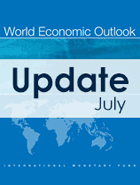| Source: Date: Updated: |
BFSB/IMF
Monday, July 25, 2016 Monday, July 25, 2016 |
The International Monetary Fund has released the July 2016 update to the World Economic Outlook amid uncertainty following the UK EU referendum result.
View or download a PDF of the communication here.
Highlights:
- Before the June 23 vote in the United Kingdom in favor of leaving the European Union, economic data and financial market developments suggested that the global economy was evolving broadly as forecast in the April 2016 World Economic Outlook (WEO). Growth in most advanced economies remained lackluster, with low potential growth and a gradual closing of output gaps. Prospects remained diverse across emerging market and developing economies, with some improvement for a few large emerging markets – in particular Brazil and Russia – pointing to a modest upward revision to 2017 global growth relative to April’s forecast.
- The outcome of the U.K. vote, which surprised global financial markets, implies the materialization of an important downside risk for the world economy. As a result, the global outlook for 2016-17 has worsened, despite the better-than-expected performance in early 2016. This deterioration reflects the expected macroeconomic consequences of a sizable increase in uncertainty, including on the political front. This uncertainty is projected to take a toll on confidence and investment, including through its repercussions on financial conditions and market sentiment more generally. The initial financial market reaction was severe but generally orderly. As of mid-July, the pound has weakened by about 10 percent; despite some rebound, equity prices are lower in some sectors, especially for European banks; and yields on safe assets have declined.
- With “Brexit” still very much unfolding, the extent of uncertainty complicates the already difficult task of macroeconomic forecasting. The baseline global growth forecast has been revised down modestly relative to the April 2016 WEO (by 0.1 percentage points for 2016 and 2017, as compared to a 0.1 percentage point upward revision for 2017 envisaged pre-Brexit). Brexit-related revisions are concentrated in advanced European economies, with a relatively muted impact elsewhere, including in the United States and China. Pending further clarity on the exit process, this baseline reflects the benign assumption of a gradual reduction in uncertainty going forward, with arrangements between the European Union and the United Kingdom avoiding a large increase in economic barriers, no major financial market disruption, and limited political fallout from the referendum.
This WEO Update briefly elaborates on these themes and their implications for policymakers. A more thorough assessment of the global outlook will be presented in the October 2016 WEO.
Transcript of the Press Conference on the Release of the July 2016 World Economic Outlook Update.











